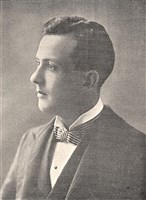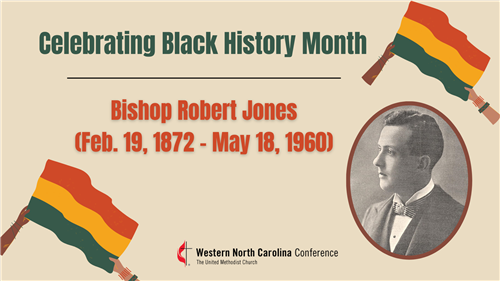Celebrating Black History Month in the WNCC: Bishop Robert Jones
February 1, 2024
By: Jim Pyatt, WNCC Archivist & Historian
 Bishop Robert Jones (February 19, 1872 - May 18, 1960)
Bishop Robert Jones (February 19, 1872 - May 18, 1960)
Bishop Robert E. Jones was significant in the life and ministry of the Methodist Episcopal Church in many ways. He and Matthew W. Clair, Sr. were the first African-Americans elected to full episcopacy in the Methodist Episcopal Church in 1920. Prior to that time four African-American clergy had been elected as missionary bishops, meaning that their service as bishops was limited to the mission field.
Bishop Jones was born in Greensboro and lived there through college, receiving his A.B. degree from Bennett College in 1895. (His brother, Dr. David Dallas Jones, served as President of Bennett College from 1926 until 1955.) He subsequently received his B.D. from Gammon Theological Seminary in 1897 and his M.A. from Bennett College in 1898. Seven colleges would later confer honorary doctorates upon Bishop Jones.
Bishop Jones was first appointed in the North Carolina Conference of the Methodist Episcopal Church in 1891, and was ordained Elder in 1894. As a clergy member of the North Carolina Conference he served the following appointments: 1891 Leaksville, 1892 Thomasville, 1893 Lexington, 1894 Reidsville, 1895-96 left with appointment to attend school, 1897-1900 Assistant Manager, Southwestern Christian Advocate, 1901-03 Field Secretary, Sunday School Board, 1904-20 Editor, Southwestern Christian Advocate. He then served as Bishop from 1920 until his retirement in 1944. Jones served as Secretary of the North Carolina Conference 1900-04. He was elected to represent the North Carolina Conference as clergy delegate to General Conference from 1904-20.
As a denominational leader Bishop Jones served on every Commission on Unification from 1916 until the 1939 merger. With regard to his involvement Bishop John Moore wrote, “Dr. Robert Jones confined himself largely to provisions relating to the Negro membership. He was always considerate, reasonable, encouraging, and forceful. His fine spirit gave great aid in working out the status of the Negro membership.” (John Moore, The Long Road to Methodist Union, p. 129) That being said, let it also be noted that he was opposed to the Central Jurisdiction and the segregation that it imposed upon the church.
Another area in which Bishop Jones provided great leadership was in the establishment of Gulfside Assembly (originally Gulfside Chautauqua and Camp Meeting Ground) in Waveland, MS in 1923. After speaking at Lakeside Assembly in Ohio in 1922, “Jones was so impressed with the facility and programs [that] he wanted a similar facility for the [African-American community.]” (https://news.lakesideohio.com/a-trip-to-lakeside-leads-to-gulfside)
In recognition of his leadership Bishop Jones received the Harmon Foundation Bronze Medal in 1927 and the Gold Medal in 1929. Bishop Jones was also known as one of the outstanding preachers and orators in Black Methodism.
As the WNC Conference observes Black History Month we celebrate the life and ministry of Bishop Robert E. Jones.

